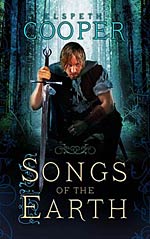
![]() ersandoval
ersandoval
8/30/2013
![]()
I really enjoyed Songs of the Earth by Elspeth Cooper. Much more than I should have, given that so much of the bones of the book was built out of such well-worn tropes. Our hero is a foundling (I'm still waiting to find out he's a lost prince) who gets in trouble because of his magic, and is whisked away by a wise old mentor to a school for magic on a tropical island. Not only is he an excellent swordsman, but it turns out that he has more and stronger magic than just about anybody and ends up saving the day after hardly any training.
To top it all off, the reason his magic got him in trouble? There's an evil, thinly-veiled, not-quite-Catholic church to stand as a beacon of hypocrisy, backwardness, and suppression of knowledge. As in, "ye shall suffer not a witch to live."
Despite all that, the story drew me in. The characters were fully fleshed out beyond their archetypes, and the prose was engaging. The plot didn't follow the cookie-cutter shape of the tropes, either; for one thing, the protagonist was twenty, not twelve or sixteen, and he had a pretty traumatic past, so there was a lot more skepticism and frustration and less wide-eyed wonder than usual. Perhaps also because he was older, the story didn't get bogged down at the school with endless scenes of lessons, but instead focused on the relationships he formed there and just enough of what he learned to move things forward.
And then there was the music. As a musician, I love seeing magic systems that involve music, and it was that music that caused me to pick the book up in the first place. I made the mistake, though, of reading Peter Orullian's "The Sound of Broken Absolutes" (from the anthology Unfettered, edited by Shawn Speakman) immediately after, and before writing this review. It truly has a musician's magic system, replete with technical descriptions of resonance and harmonics, musical notation, the mechanics of throat and mouth, and even how to rebuild a broken instrument. Songs of the Earth has none of that. Its magic is much more wild and fluid. It's a lovely metaphor, actually, the energy of the earth as music that can be accessed and channeled as magic. I've always thought music was rather magical, so it makes perfect sense to me. The descriptions are beautifully poetic, evocative of nature and emotions in the same way as music—exactly as it should be.